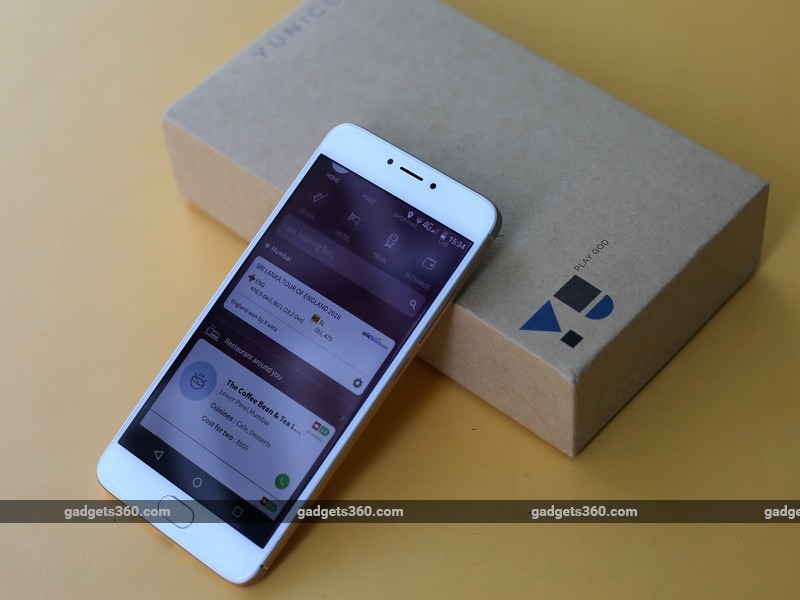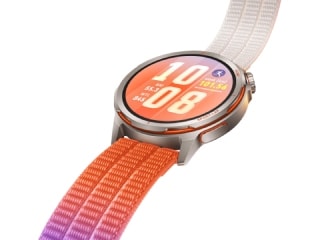- Home
- Mobiles
- Mobiles Reviews
- Yu Yunicorn Review
Yu Yunicorn Review

Yu Televentures' quest to redefine the flagship smartphone continues with its latest offering, the Yu Yunicorn. Its previous attempt, the Yutopia (Review), was an ambitious smartphone which looked tempting on paper, but didn't quite fulfil our expectations when we tested it.
This time with the Yunicorn, the company has decided to dial it down a bit and focus on a few key areas such as software and services. The smartphone launches in the crowded, cutthroat sub-Rs. 15,000 segment, which is not an easy space to compete in by any measure. The Yu Yunicorn will have to prove its mettle against the likes of the Xiaomi Redmi Note 3 (Review) , Lenovo Zuk Z1 (Review) and Moto G4 Plus (Review). Let's see how well it manages to do so.
Look and feel
One look at the phone and it's easy to see that the Yunicorn is the best looking and best built Yu smartphone to date. The metal unibody is well crafted and the lightly brushed look for the back is a good aesthetic touch. It's not very slim at 8.5mm and is also a bit on the heavy side at 172 grams but we managed to get used to it. The front of the phone looks virtually identical to that of the Oppo F1 Plus while the rear camera section reminds us a lot of the Redmi Note 3. It's not uncommon for designs to overlap, but we expect at least some originality when it comes to design.
The 5.5-inch full-HD display has a dense enough pixel count for sharp pictures and text. Sunlight legibility is fairly good and we didn't face any issue with the touch response. The screen gets protective glass from NEG (Nippon Electric Glass). The borders on each side of the screen are slim. There's a notification light above it and a physical home button below. The latter also has an integrated fingerprint sensor, which works well for unlocking the phone.
There's a single hybrid Dual-SIM tray on the left, while the power and volume buttons are placed on the right. The buttons are bit stiff to press and could have done with better tactile feedback. The headphones socket and Micro-USB port are placed on the top and bottom respectively. There are grilles on either side of the USB port but the phone only has a mono speaker.
Around the back, we have the 13-megapixel camera along with a dual-tone LED flash. The battery is non-removable. The Yunicorn comes with a 10W power adapter, data cable, and an in-ear headset. The quality of the accessories has definitely improved over the years, which is good.
Specifications and software
Yu has fitted the Yunicorn with a fairly powerful octa-core MediaTek Helio P10 SoC and 4GB of RAM. This processor supports a wide array of LTE bands along with carrier aggregation. You also get 32GB of storage which can be expanded by up to 128GB, Wi-Fi b/g/n, Bluetooth 4.1, USB-OTG, and GPS. What's missing are NFC and FM radio.
For software, we have a near-stock version of Android Lollipop 5.1.1 which Yu calls "Android on Steroids". The enhanced launcher has a custom icon set and features the next version of Yu's Around feature. The new Around service features Yu Wallet, which is powered by UDIO for recharging your mobile, DTH or data card. Yu has also teamed up with Lybrate to offer doctors' assistance right from your phone. This feature is still being worked on so it will only show up after about a month, as an OTA update. Retail units will reportedly have the company's MiMedia social cloud pre-installed, which the company says will offer unlimited cloud storage for media files. Yu has also promised a Marshmallow update in about a month, with an improved app drawer design based on user feedback. Unfortunately, we couldn't test any of these features since they haven't been rolled out yet.
There aren't many apps other than the essentials like a file manager, sound recorder and the YUniverse Web browser. The Yunicorn also has YU's cloud service for backing up your SMS, contacts, call logs, settings and Whatsapp data. One thing that Yu aims to fix when the phone goes on sale is getting rid of the redundant music players. Currently, there's Gaana, Play Music, and an older version of Google Music Player, of which only Gaana will remain as the default going ahead.
Performance
The Yunicorn does a good job of multitasking, loading apps and playing games - essentially being a good modern-day smartphone. The phone didn't really heat up during our usage other than getting slightly warm when charging or gaming. The phone worked well on our 4G networks too. The metal back can be very slippery and we nearly dropped the Yunicorn a couple of times when commuting. Performance is decent enough to run most games with ease. The AnTuTu benchmark gave us a score of 33,903 while GFXbench returned 15fps in the T-Rex test.
The phone does a decent job at multimedia playback too, handling full-HD videos fairly well, including our high-bitrate files. The speaker is fairly loud and is good enough for alerts. The music player is well integrated into the Gaana app, which has equaliser presets too.
The rear 13-megapixel camera features a five-element lens with EIS (electronic image stabilisation). Pictures captured in daylight exhibit good colours for landscapes and macros, however the level of detail is noticeably lacking when you try to crop photos. Even in close-up shots, the edges around the object in focus aren't very sharp. HDR mode has the same ghostly effect on pictures as we observed with the Yutopia. The biggest problem however is the slow focusing system, which is an issue even in daylight. The camera app takes a full second (sometimes more) to lock focus and then another second or two to actually save an image.
(Tap to see full size Yu Yunicorn camera samples)
This problem is amplified when the lights go dim, and the Yunicorn really struggles in low-light and even indoor settings. Once again, the camera manages to capture decent colours but details aren't great if you zoom in. There's also a lot of lag while operating the menus within the app. You get a bunch of filters to choose from, a panorama mode, and picture-in-picture. The quality of recorded video is strictly okay too. You do get a slow motion mode but the resolution is limited to 640p. The front 5-megapixel camera captures passable selfies when the lighting is good. Overall, the Yunicorn's cameras are not its strongest suit, so if that's important then you should look elsewhere.
Battery life
The 4000mAh battery lasted for 14 hours, 46 minutes in our video loop test which is very good. With regular use, the phone usually lasted a day and a half, sometime stretching to two days. You should be able to push it a bit more if you limit your gaming and 4G usage. Fast charging is sorely missing here but even without it, you can get up to about 20 percent in half an hour.
Verdict
The Yu Yunicorn is priced at Rs. 12,999 but this is an introductory price which will go up to Rs. 13,499 after a month. The company is working on getting the phone to some offline stores too, so it should be easy to buy for those who prefer not to shop online. The biggest strengths of the Yunicorn are its build quality, aesthetics, battery life, and interesting software services. However, it also does have some shortcomings like the underwhelming camera, its weight, and little things like the lack of FM radio and Wi-Fi ac.
We understand that it's hard to build a phone that excels in all departments, especially at this price. However, people shopping for a phone in this segment aren't necessarily looking for perfection. All they want is a good all-rounder that's decently powerful and can last through a few software upgrade cycles until it's time to upgrade to something else. Phones such as the Xiaomi Redmi Note 3, Lenovo Zuk Z1 and Moto G4 Plus offer all this and then some. It's going to be tough for the Yunicorn to compete with this kind of competition given its shortcomings, and so it is hard to recommend.
Yu Yunicorn in pictures
Get your daily dose of tech news, reviews, and insights, in under 80 characters on Gadgets 360 Turbo. Connect with fellow tech lovers on our Forum. Follow us on X, Facebook, WhatsApp, Threads and Google News for instant updates. Catch all the action on our YouTube channel.
Related Stories
- Samsung Galaxy Unpacked 2026
- iPhone 17 Pro Max
- ChatGPT
- iOS 26
- Laptop Under 50000
- Smartwatch Under 10000
- Apple Vision Pro
- Oneplus 12
- OnePlus Nord CE 3 Lite 5G
- iPhone 13
- Xiaomi 14 Pro
- Oppo Find N3
- Tecno Spark Go (2023)
- Realme V30
- Best Phones Under 25000
- Samsung Galaxy S24 Series
- Cryptocurrency
- iQoo 12
- Samsung Galaxy S24 Ultra
- Giottus
- Samsung Galaxy Z Flip 5
- Apple 'Scary Fast'
- Housefull 5
- GoPro Hero 12 Black Review
- Invincible Season 2
- JioGlass
- HD Ready TV
- Latest Mobile Phones
- Compare Phones
- Leica Leitzphone
- Samsung Galaxy S26+
- Samsung Galaxy S26 Ultra
- Samsung Galaxy S26
- iQOO 15R
- Realme P4 Lite
- Vivo V70
- Vivo V70 Elite
- Asus TUF Gaming A14 (2026)
- Asus ProArt GoPro Edition
- Huawei MatePad Mini
- Infinix Xpad 30E
- Huawei Watch GT Runner 2
- Amazfit Active 3 Premium
- Xiaomi QLED TV X Pro 75
- Haier H5E Series
- Asus ROG Ally
- Nintendo Switch Lite
- Haier 1.6 Ton 5 Star Inverter Split AC (HSU19G-MZAID5BN-INV)
- Haier 1.6 Ton 5 Star Inverter Split AC (HSU19G-MZAIM5BN-INV)


















